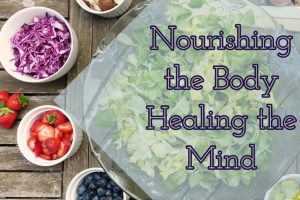The Ultimate Guide to Nourishing Your Body and Mind

Understanding the Mind-Body Connection
The concept of the mind-body connection has gained significant attention in recent years, bridging the gap between mental and physical health. This intricate relationship implies that our mental state can profoundly influence our physical health and vice versa. For instance, have you ever noticed how stress can lead to physical symptoms like headaches or stomachaches? Similarly, a positive mindset can boost your immune system and overall vitality. Understanding this connection is crucial for anyone who wants to achieve a balanced and fulfilling life.
- The Ultimate Guide to Nourishing Your Body and Mind
- Understanding the Mind-Body Connection
- Importance of Nourishment
- Nourishing Your Body
- Balanced Diet and Nutrition
- Hydration and Its Benefits
- Nourishing Your Mind
- Mental Health and Well-being
- Stress Management Techniques
- Physical Activity and Exercise
- Types of Physical Activities
- Benefits of Exercise for Body and Mind
- Quality Sleep for Optimal Health
- Importance of Good Sleep Habits
- Tips for Improving Sleep Quality
- Mindfulness and Meditation
- Practicing Mindfulness Daily
- Meditation Techniques for Beginners
Importance of Nourishment
Nourishment plays a vital role in supporting both the mind and body. It’s not just about eating; it’s about providing the right fuel to thrive. Adequate nutrition can enhance cognitive function, reduce anxiety, and increase energy levels. Here are some reasons why nourishment is essential:
- Cognitive Health: Nutrient-rich foods improve memory and concentration.
- Emotional Stability: A balanced diet contributes to better mood regulation.
- Physical Strength: Proper nourishment supports muscle function and recovery.
Consider this: A diet lacking in essential vitamins and minerals can result in fatigue and poor mental health, while nutritious meals can energize you, making daily tasks feel effortless. Incorporating nourishing foods into daily life doesn’t have to be a chore. Simple changes, like swapping out processed snacks for fruits and nuts, can significantly impact overall well-being. Ultimately, understanding and nurturing the mind-body connection through quality nourishment allows for a more vibrant, healthier life.
Nourishing Your Body
Balanced Diet and Nutrition
Building on the understanding of the mind-body connection, nourishing your body with a balanced diet is essential for maintaining both physical and mental well-being. A balanced diet comprises various food groups that provide the nutrients needed to function optimally. Imagine waking up feeling energized and ready to tackle the day. This is often a result of consistent healthy eating habits. Incorporating the following categories into your meals can help you achieve this:
- Fruits and Vegetables: Aim for a colorful variety. These are loaded with vitamins, minerals, and antioxidants.
- Whole Grains: Choose brown rice, oats, and whole-grain bread for sustained energy throughout the day.
- Protein Sources: Include lean meats, fish, legumes, and nuts to support muscle health and repair.
- Healthy Fats: Avocados, olive oil, and fatty fish contain essential fatty acids that benefit brain health.
Remember, balance is key; moderation over restriction keeps your relationship with food positive.
Hydration and Its Benefits
Equally important as diet is hydration. Many people underestimate the power of water, yet it plays a pivotal role in sustaining life and wellness. Drinking enough water can enhance energy levels, improve digestion, and even boost mood. Here are some benefits of staying hydrated:
- Improved Concentration: Studies show that even mild dehydration can negatively impact focus and cognitive functions.
- Physical Performance: Adequate hydration supports endurance and reduces the risk of cramps during exercise.
- Detoxification: Water helps flush out toxins, promoting healthier skin and body function.
To ensure proper hydration, consider setting reminders to drink water throughout the day and carry a reusable water bottle. Incorporating hydrating foods like cucumbers and watermelon can also assist in meeting daily water intake. By nourishing the body through balanced nutrition and hydration, individuals can pave the way for better overall health and vitality.
Nourishing Your Mind
Mental Health and Well-being
Just as nourishing your body is essential for physical vitality, so too is nurturing your mind for overall mental health and well-being. Mental health significantly influences how we feel, think, and act in our daily lives. It also shapes our ability to manage stress, build relationships, and make choices. Take a moment to reflect on your feelings. Have there been times when stress or anxiety clouded your thoughts? Recognizing and addressing your mental health is the first step toward optimal well-being. Some key aspects of mental health include:
- Self-awareness: Understanding your emotions enables you to manage them better.
- Social connections: Developing supportive relationships can foster resilience and positivity.
- Positive coping strategies: Implementing constructive habits can enhance your mood and outlook on life.
Investing time and effort into mental health is just as vital as maintaining physical health.
Stress Management Techniques
Stress is an inevitable part of life, but managing it in healthy ways can significantly improve mental well-being. Finding what works best for you can be transformative. Here are some effective stress management techniques:
- Deep Breathing Exercises: Taking a few minutes to focus on your breath can calm your mind and reduce anxiety.
- Regular Physical Activity: Engaging in exercise, even a brisk walk, can release endorphins and elevate your mood.
- Journaling: Writing down your thoughts and feelings can provide clarity and a sense of relief.
- Connecting with Nature: Spending time outdoors can rejuvenate your senses and provide a break from daily stressors.
Consider trying out these methods to see which ones resonate with you. Ultimately, nurturing your mind through awareness and effective stress management techniques equips you with the tools needed to handle life’s challenges with grace and resilience.
Physical Activity and Exercise
Types of Physical Activities
Building on the importance of nourishing both your mind and body, engaging in regular physical activity is a superb way to enhance your overall health. Exercise comes in many forms, allowing everyone to find something that suits their lifestyle and preferences. Here are some popular types of physical activities to consider:
- Aerobic Exercise: Activities like running, swimming, or dancing elevate your heart rate, improving cardiovascular health.
- Strength Training: Weightlifting or bodyweight exercises, such as push-ups and squats, build muscle and boost metabolism.
- Flexibility and Balance: Yoga and tai chi not only improve flexibility but also enhance balance and reduce stress.
- Recreational Sports: Join a local soccer or basketball team to enjoy exercise while forging social connections.
No matter which type you choose, the key is to find something you genuinely enjoy, making it easier to stick with it long term.
Benefits of Exercise for Body and Mind
The benefits of incorporating physical activity into your routine extend beyond aesthetics. Regular exercise positively impacts both the body and mind in numerous ways:
- Enhanced Mood: Exercise releases endorphins, often referred to as “feel-good” hormones, which can significantly reduce feelings of anxiety and depression.
- Increased Energy Levels: Regular movement boosts overall stamina, making daily tasks feel less tiring.
- Improved Cognitive Function: Studies suggest that physical activity enhances memory and brain function, keeping your mind sharp as you age.
- Better Sleep Quality: Exercise can help regulate sleep patterns, enabling you to fall asleep faster and enjoy deeper rest.
Ultimately, making physical activity a part of your daily routine not only nourishes your body but is also a powerful tool for enhancing mental health. Finding joy in movement fuels both physical vitality and emotional well-being, paving the way for a balanced, fulfilling life.
Quality Sleep for Optimal Health
Importance of Good Sleep Habits
As we complete the discussion on physical activity and its benefits, we must not overlook another crucial element of maintaining health: quality sleep. Often, sleep is undervalued, yet it is integral to our overall well-being. Good sleep habits can profoundly affect both mental and physical health, leading to improved mood, focus, and productivity. When we consistently prioritize sleep, we allow our bodies to repair and regenerate. Lack of quality rest can lead to:
- Increased Stress: Without adequate sleep, the stress hormone cortisol rises, heightening anxiety.
- Weakened Immune Function: Sleep is vital for a robust immune response; inadequate rest can make you more susceptible to illness.
- Impaired Cognitive Function: During sleep, the brain processes information and consolidates memories. Poor sleep can hinder this ability.
In short, cultivating good sleep habits is fundamental for a balanced lifestyle.
Tips for Improving Sleep Quality
Fortunately, improving sleep quality can be straightforward with a few intentional changes. Here are some practical tips to consider:
- Establish a Sleep Schedule: Going to bed and waking up at the same time every day helps regulate your body’s internal clock.
- Create a Relaxing Bedtime Routine: Engage in calming activities before sleep, such as reading or meditating, to signal to your body that it’s time to wind down.
- Limit Screen Time: Reducing exposure to screens at least an hour before bed minimizes blue light interference, which can disrupt sleep patterns.
- Optimize Your Sleep Environment: Keep your bedroom dark, quiet, and cool. Consider investing in blackout curtains or earplugs if necessary.
By implementing these strategies, individuals can make significant strides toward achieving optimal sleep quality. Prioritizing rest is not just an act of self-care; it’s a vital component of sustained physical and mental health that ultimately enhances one’s quality of life.
Mindfulness and Meditation
Practicing Mindfulness Daily
Transitioning from the importance of quality sleep, another powerful tool for enhancing well-being is mindfulness. Practicing mindfulness daily can significantly improve mental clarity and emotional resilience. Mindfulness involves being fully present in the moment, acknowledging your thoughts, feelings, and sensory experiences without judgment. Imagine sipping your morning coffee and truly savoring every sip. This simple act, when done mindfully, can transform a mundane routine into a moment of joy and gratitude. Here are some easy ways to incorporate mindfulness into your daily life:
- Mindful Eating: Take time to enjoy your meals without distractions. Focus on the flavors, textures, and aromas of your food.
- Breathing Exercises: Spend a few moments each day to concentrate on your breath. Inhale deeply through your nose, hold for a few seconds, then exhale slowly through your mouth.
- Body Scan: This technique involves mentally scanning your body from head to toe, noticing any areas of tension or discomfort.
Practicing these techniques regularly fosters a deeper connection to yourself and the world around you.
Meditation Techniques for Beginners
For those looking to deepen their mindfulness practice, meditation is a fantastic avenue to explore. It can be intimidating for beginners, but even a few minutes a day can yield profound benefits. Here are some effective meditation techniques to consider:
- Guided Meditation: Use apps or online videos that lead you through meditation practices, guiding your focus and relaxation.
- Focused Attention: Choose a single object, sound, or mantra to concentrate on. If your mind wanders, gently bring it back to your point of focus.
- Loving-Kindness Meditation: This involves cultivating feelings of compassion and kindness towards yourself and others, significantly enhancing emotional well-being.
Starting with just five minutes a day can make a difference. As you grow comfortable, gradually extend your practice. The journey into mindfulness and meditation opens up a world of calm and clarity, enriching not only your mental health but your overall life experience. By embracing these practices, you can navigate daily challenges with greater ease and confidence.




